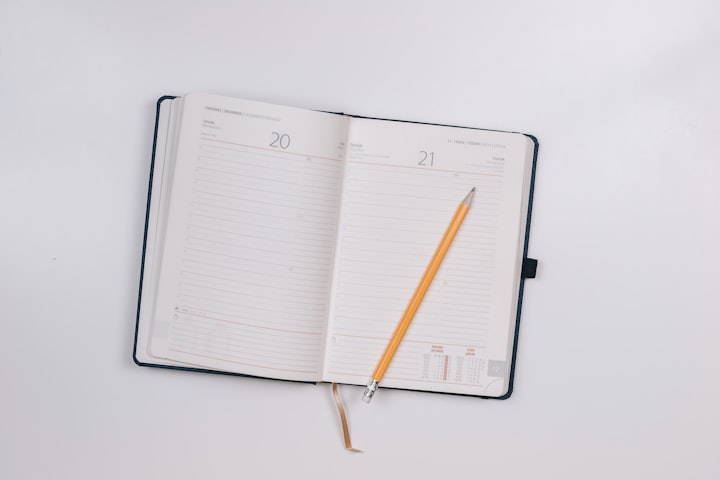Science and Diary Writing: Mental and Physical Benefits
The neuroscience behind what diary writing can do for your mind and body

I’ve been told that diary writing is only a certain demographic; troubled hipsters or spoiled kids who use their diaries to whine endlessly. They’ll write pages soaked with tears brought on by insignificant problems which are amplified by their weakness and sensitivity. In other words, diary writing is for the weak snowflakes of the world who would rather cry about their problems than solve them. The type of person natural selection would “take care of”.
But, to whoever is reading this, I hope you realize how wrong that is and how toxic this generalization can be. Writing is regarded as an intelligent and interesting hobby. So why are diary writers so demonized?
After all, most of the knowledge we know of one of the most well-known experiences of the Holocaust comes from the diary of Anne Frank.
Understanding The Negative Connotation Associated with Diary Writers
The mold that diary writers have been lumped into comes from a single upsetting fact: people still don’t believe in taking proactive measures for your mental health.
Unfortunately, we know some people still don’t believe that a holistic approach to health includes mental health. And we also know that some people (wrongly) believe that doing things to improve mental health (such as therapy, and diary-writing) is automatically an admission that something is wrong with you; that you’re weak.
Even if you aren’t writing a diary for a therapeutic effect (as diary writing can be for a myriad of reasons), people still have a hard time believing that reflecting on your life in writing isn’t a weakness.
Some people simply don’t understand that there’s more to life than just living it; it’s important to reflect upon it and learn from it. Those who realize this are living life differently from anti-diary writers; making diary writers “weird”. Sometimes difference is really all it takes for a demographic to earn themselves a stigma.
What Can Diary Writing Do For You; The Science Behind it
You may have a vague understanding of the benefits of diary writing. Sure, it helps you learn from your mistakes and whatnot. But what about the science-based benefits of diary writing?
The American Psychological Association writes on the scientific benefits of writing a diary, citing the September issue of APA’s Journal of Experimental Psychology: General (JEP: General) (Vol. 130, №3).
The APA writes that “expressive writing reduces intrusive and avoidant thoughts about negative events and improves working memory. These improvements, researchers believe, may in turn free up our cognitive resources for other mental activities, including our ability to cope more effectively with stress.”
A study conducted at UCLA by Stuart Wolpert finds that putting feelings into words has a therapeutic effect in the brain.
According to the study, when people see a picture of an angry face, there is a response in the brain’s amygdala; prompting the body to be ready to protect itself in case it is in danger.
However, the study found that when you label the photograph as “angry” or “angry face”, the amygdala was less active and the right ventrolateral prefrontal cortex was more active. This area of the brain has been associated with processing emotions.
Interestingly enough, when you attach the name “Harry” to the photo, you don’t see a decrease in the amygdala’s response; further solidifying the finding that putting feelings into words can have a therapeutic effect.
Furthermore, James Pennebaker published research at Cambridge University on both the emotional and physical benefits of expressive writing. Pennebaker finds that journaling can strengthen your immune system. Among other health benefits, journaling was found to:
1. Improve immune system functioning
2. Reduce blood pressure
3. Improve lung function
4. Improve liver function
So, I Should Start Diary Writing, But How?
Diary writing may seem intimidating at first, but it doesn’t have to be. It is imperative that you realize that there is no perfect way to journal and that everyone writes differently. Some follow prompts and some simply vent to their diary every day; it all depends on what works for you.
A great way to start is by simply recording your day. This can be done in bullet points or full sentences; whatever you feel more comfortable with. You may also want to record how you felt during key moments during your day or write about difficult times during the day.
You may also want to reflect on your past experiences. This can be done by responding to prompts (there are tons online!) or just by writing about hard experiences or beautiful moments that shaped you to be the person you are today.
A common problem is that people have trouble committing to a diary. Remember that a diary doesn’t have to be full to the brim; teaming with words. There are no expectations with a diary. You can write as little or as much as you want. Don’t shy away from a diary just because you feel it has to be a certain way; it does not.
If you are having trouble finding the time to journal or simply can’t get in the habit of it, try setting up daily reminders on your phone. You can set them to remind you to write at a time that is convenient for you. The evening time, just as you are winding down to go to bed, can be a good time to write in your diary. It can even help you feel sleepy enough for bed!
It is important to get into a good routine of writing a diary so that way you can maintain the habit. After all, there are way too many benefits to ignore!
So, to the people who believe that writing a diary is laughable and doesn’t do anything; I encourage you to try and refute the science. Good luck.
About the Creator
Soha Sherwani
Hello everyone! You can find me @SherwaniSoha on Twitter and @SohaSherwani on Medium!
Thanks for reading!






Comments
There are no comments for this story
Be the first to respond and start the conversation.